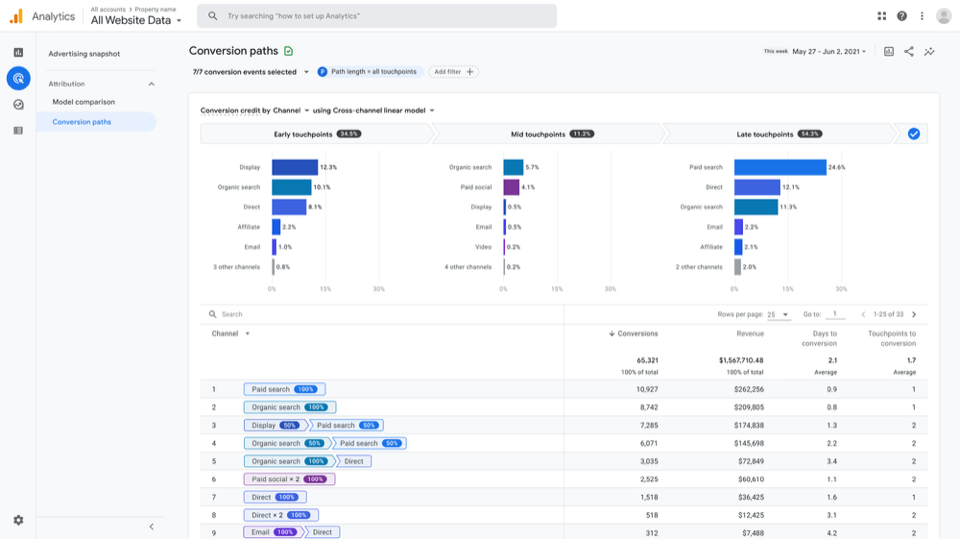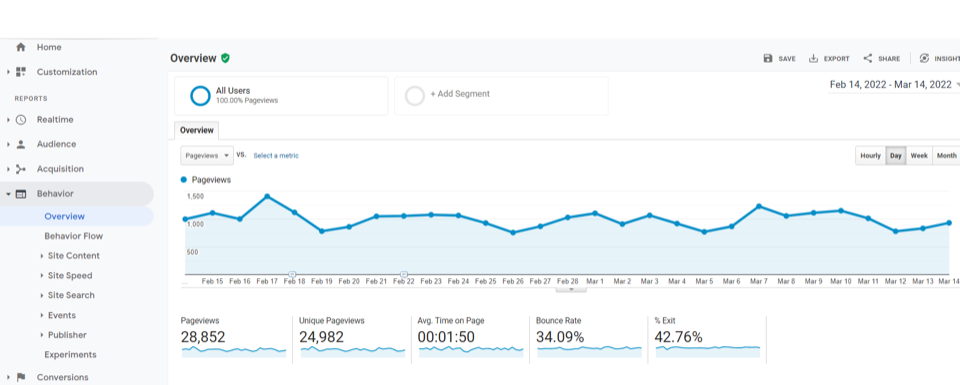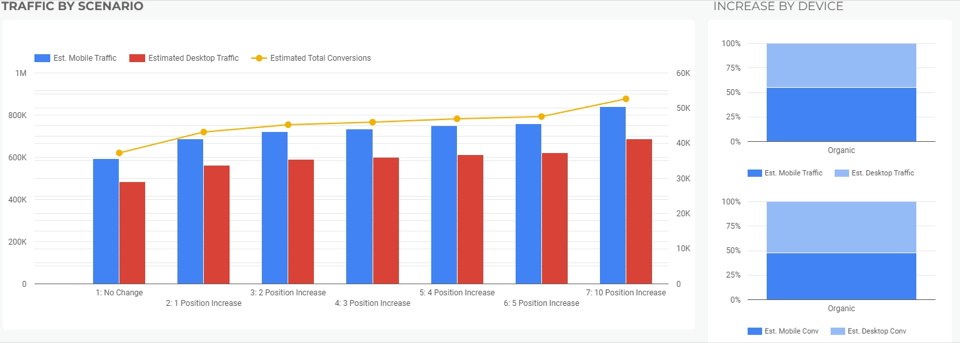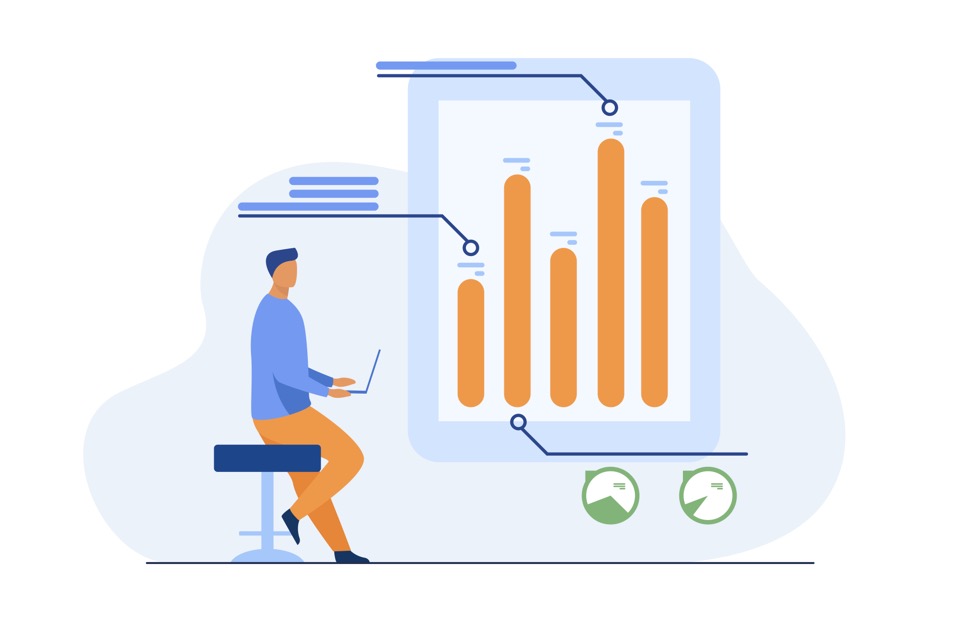We tend to look at popular metrics like conversion rates and open rates as the best tools for judging an SEO strategy’s performance, but they don’t quite show you the bigger picture. If you’re serious about improving your business’s content marketing strategy, you need to be an exceptional reader of SEO analytics reports. Here’s why.
Knowledge Is Power

Source: Google
An SEO report gives you a bird’s-eye view of how your website is performing from keyword performance to traffic trends.
- Never Miss a Detail: Your traffic might be up for the month, but it won’t do much for your growth if your conversion rates and load speeds are down. Being able to see the broader performance trends of your website gives you the power to make better decisions for your business.
- Drive Value: Keeping an eye on reporting is one of the most efficient ways for clients to measure the value that their agency is creating for them. Give your website the performance it deserves with better accountability and transparency.
Plan Ahead: The best SEO analytics reports aren’t just measures of value; they’re also tools that you can use to forecast performance and fine-tune your website.
What Makes a Great SEO Report?
Agencies could easily skip the work and print out a Google Analytics report with automated monthly stats, but clients deserve more from an industry valued at $80 billion. A great SEO report saves you the trouble of having to decipher hundreds of pages of keyword stats while creating value with suggestions and a vision for the future.
Above all, your SEO report should answer these questions:
- What has been done so far?
- From analytics to campaign strategies, SEO reports should outline the work that’s been done for your business so far. Reports shouldn’t ignore negative trends, as they can contain valuable lessons for the business moving forward.
- From analytics to campaign strategies, SEO reports should outline the work that’s been done for your business so far. Reports shouldn’t ignore negative trends, as they can contain valuable lessons for the business moving forward.
- What strategies were involved in achieving these results?
- How did we get here? The report should briefly outline the thought process and strategy that went into crafting your achievements. Explanations shouldn’t contain too much jargon. Reports should use a simple template to relay information that your business can understand and grow from.
- How did we get here? The report should briefly outline the thought process and strategy that went into crafting your achievements. Explanations shouldn’t contain too much jargon. Reports should use a simple template to relay information that your business can understand and grow from.
- How can this performance (if positive) be continued and improved?
- An SEO analytics report is only as good as the suggestions it contains. Your report should include realistic targets for further growth and potential strategies that you could take to achieve them.
Crafting an Exceptional SEO Report
Creating an SEO report involves quite a bit of prior planning, just as one would research keywords before performing SEO. Whether you create a report in-house or hire an SEO service company, you have a few choices to make upfront.
Choosing Metrics
Before you hire an agency, ask them which metrics they would choose for a report on your website. No two businesses will have the same SEO report; each business has its own unique goals and interests. For example, a report about backlink performance for a business that’s aiming to increase email open rates is unlikely to turn any heads. You’ll want to make sure an agency isn’t just handing you a cookie-cutter report template with no thought behind the metrics.

If you select too few KPIs, your report won’t reflect the bigger picture of your business’s performance. On the other hand, if you choose too many, you run the risk of crafting an unfocused and overwhelming report. There’s a Goldilocks zone here that your ideal agency has to identify before crafting an SEO analytics report.
SEO Reporting Tools
You can use anything from a pie chart to a keyword spreadsheet to report on SEO, but a reporting tool just makes life easier. The right tools will do the heavy lifting for you and save you the hassle of manually compiling pages of stats. Here are a few you could use:
- Semrush: Effective at tracking competitor performance and provides multi-layered reports for almost everything you’d want to know about your website. Certain analytical features can, however, end up being costly.
- Google Analytics: A balanced analytics platform suitable for most SEO reports. Their renewed focus on data visualization goes a long way in crafting appealing reports. A relative lack of automation features could be a downside here.
- Ahrefs: A great choice for their automated reports, free keyword SEO tools, and backlink analysis features.
Once you’ve chosen a reporting tool, it’s time to write!
Structuring Your Report
Traffic
Traffic is connected to most goals a business would typically have for their website. Starting an SEO report by analyzing traffic is a great way to provide context for your other data points.
Tools like Google Analytics will come in handy here by allowing you to segregate traffic data by sources. Tapping into different streams of traffic can help your business corner new niches and build new customer bases. Google has cornered 85% of the search engine market, but playing for that remaining 15% can give your business an invaluable competitive advantage. Pay attention to all traffic sources in your analytics overview, not just google.com.
It’s easy for SEO reports to get caught up in keyword rankings and conversion-related stats while overlooking details like mobile traffic. Mobile sources made up an impressive 63% of traffic in 2021, and your mobile audience can no longer be considered a niche. Paying attention to details like these will put your business on the fast track to growth.
Content
Content marketing is a powerful source of traffic and conversions. Businesses that invest in optimized social media and blogs would benefit immensely from an analytical report on their content’s SEO performance. This could involve ranking popular pages for insights into what your customers are looking for and how those pages are contributing to conversions.
Keywords
There has been some debate about the usefulness of including keyword rankings in SEO analytics reports due to their built-in ambiguity. Rankings have long been used in reports to measure website performance, but they can also be misleading. Businesses tend to correlate higher keyword rankings with conversions, but this isn’t always the case, such as when pages have been optimized for the wrong keywords.
That said, keyword rankings are still an important piece of the SEO puzzle, and they can add a fair bit of context to your website’s performance trends. Keyword rankings can be used to explain page visibility trends when combined with other elements of the SEO report, like traffic and load speeds.

Conversion Rates
Traffic is great, but conversions pay the bills. This section of the SEO analytics report will contain some of the most useful actionable insights for your business. A good agency will demonstrate conversion rates by tracking goals.
For example, successful purchases could be measured by tracking visits to a post-checkout ‘Thank You’ page. Google Analytics users can easily set new goals and choose new pages to track from their dashboard.
Technical Reporting
Technical reporting includes aspects like page load speeds and the time users spend on your pages. Including technical aspects in your SEO report is just as important as reporting on keyword rankings or conversion rates. The overall health of your website plays a huge role in determining your search engine rankings and affects the user experience.
The probability of a visitor clicking off of your website (also known as a bounce), shoots up by 32% as load times increase from 1 to 3 seconds. Every millisecond of website performance counts here, and you can use an SEO analytics report to spotlight the pages that need to be optimized further and the ones that are already performing well.
Bounce rates and dwell times are also worth including in an SEO report for similar reasons. It pays to know how much time a visitor is spending on a page, and how many pages it takes for them to click off of your website entirely. Trends are key here, an increase in bounce rates is a strong indicator that a page needs to be reworked. In contrast, a consistently low bounce rate can point to a model that your other pages should emulate.
Much like with keyword rankings, nuance is important when reporting on bounce rates for SEO. High bounce rates can be normal for certain types of pages. Product pages that are full of internal links can display high bounce rates as visitors tend to click off to explore other products.
Recommendations
As a business, this is what you should be looking for in an SEO analytics report. If you’re hiring an agency, this is their chance to set realistic expectations about what you can expect from them, whether that’s just for the next 30 days or even for the long term.
This can be followed up with a concise summary of what’s been explored in the report and the most important conclusions that your business should take away from it. This is an opportunity to make a lasting impact with your achievements and provide an explanation for the things that didn’t go well.

Mistakes To Avoid
Far too many meticulously designed SEO analytics reports miss the mark due to a few easily rectifiable mistakes:
- Myopic Focus: Dedicating a disproportionate amount of space to a single goal like keyword rankings can make for an unbalanced SEO report. An exceptional report will take the time to explore every facet of the website important to you in order to show you the bigger picture. There is no ‘golden metric’ that deserves to take up half the report, and extraneous factors like personalized and location-based searches should also be accounted for.
An extension of this problem is an agency’s tendency to gloss over the negatives while creating a report. A good agency will recognize that SEO reports are tools for improvement, not for impressing clients. - Standardized Reporting: The many free reporting templates available online can often be a trap for your business. Sticking to standardized SEO reporting formats can cause you to miss out on crucial analytics unique to your business. Most reports report on the usual metrics like traffic, conversion rates, and keywords. A more personalized solution would also comment on:
- Website Crawlability: Businesses that upload time-sensitive content need their pages to get indexed and crawled quickly. Are your pages being optimized for maximum crawlability? A personalized SEO report will break away from the usual keyword rankings to answer these questions.
- Linking: Internal, inbound, and outbound links now play a massive role in determining the overall credibility and ranking of your website. Reporting tools can be used to quickly assess your link building strategy.
- Competitor Analysis: SEO reports need a baseline for their analytics to make sense. Analyzing your performance and measuring it against the broader marketplace is an efficient way to benchmark for success.
- Website Crawlability: Businesses that upload time-sensitive content need their pages to get indexed and crawled quickly. Are your pages being optimized for maximum crawlability? A personalized SEO report will break away from the usual keyword rankings to answer these questions.
- Omitting the Customer Journey: Every metric and keyword ranking tells a story and impacts the end user. SEO reports should take the time to relate those KPIs to the customer’s journey. Don’t just state that conversions have increased for the month, demonstrate how your optimized landing pages are contributing to the funnel.
Maximize Your Value
Mastering the art of SEO analytics reporting will squeeze more value out of every single keyword and landing page. The ideal report understands what your business wants to achieve and makes your journey easier. Follow BESTSEO for more tips on staying ahead of the SEO curve with strategies that put you first.

